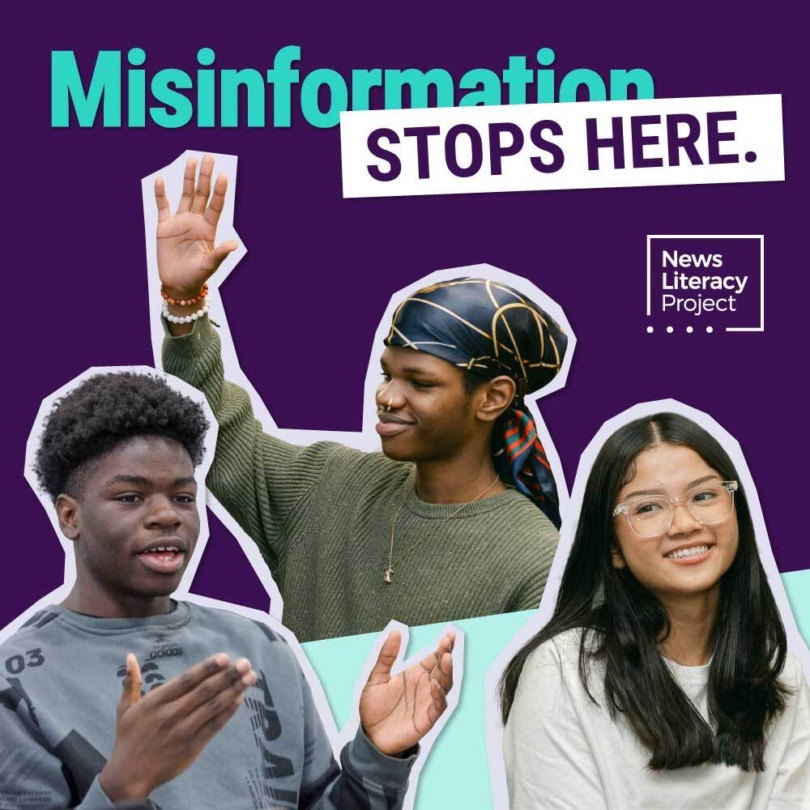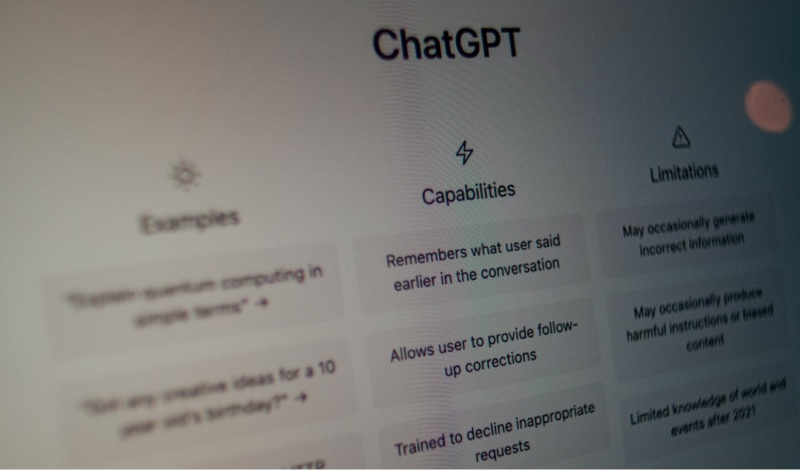
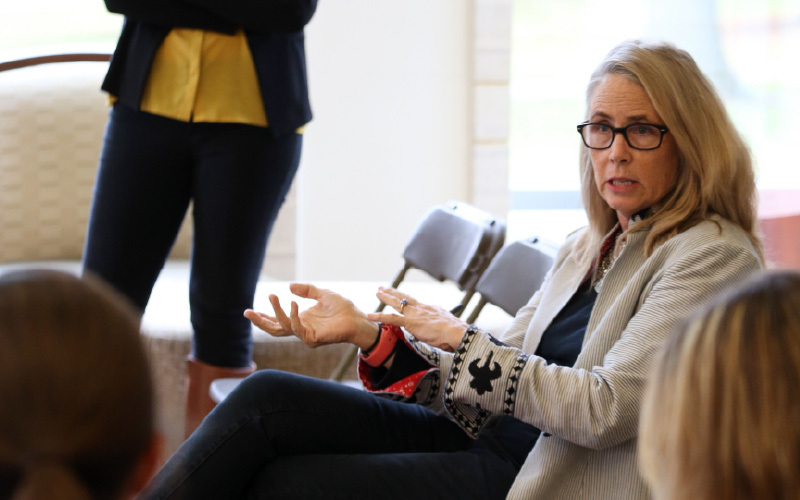
Alicia Shepard’s legacy as a ‘journalist’s journalist’ and news literacy champion
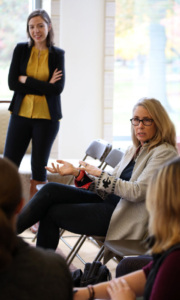 The vantage point from which journalist Alicia C. Shepard witnessed the world was both stunningly heartfelt and sharply intelligent — a filter that colored her career, her life, and her extensive work as one of the earliest classroom volunteers for the News Literacy Project.
The vantage point from which journalist Alicia C. Shepard witnessed the world was both stunningly heartfelt and sharply intelligent — a filter that colored her career, her life, and her extensive work as one of the earliest classroom volunteers for the News Literacy Project.
“She was a journalist’s journalist,” said NLP Founder Alan C. Miller. “She was smart, tough and uncompromisingly honest.”
Shepard died April 1 from lung cancer. She was 69 and is survived by her husband, David Marsden, and son, Cutter Hodierne, from her first marriage.
Known to friends as “Lisa,” she served as NPR ombudsman from 2007 to 2011. By then, her byline was well known from her work at Scripps League Newspapers, the San Jose Mercury News, and the American Journalism Review. Her book, Woodward and Bernstein: Life in the Shadow of Watergate, further secured her position as a thought leader in the industry.
Grace under pressure
A few years after NLP’s founding in 2008, Shepard met Miller and became one of scores of journalists to enthusiastically volunteer to go into middle and high schools in the Washington D.C., region, New York City and Chicago for the organization’s foundational classroom program.
“We told the journalists to think of the students as consumers of news and other information and to give them the tools to determine what to trust, what to share and what to act on,” Miller said. “Lisa totally got this.”
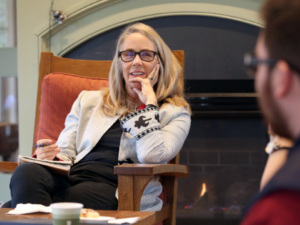 This was never more evident than the day she visited Bethesda Chevy Chase High School in a Maryland suburb of Washington, where, by all accounts, Shepard showed incredible grace under pressure.
This was never more evident than the day she visited Bethesda Chevy Chase High School in a Maryland suburb of Washington, where, by all accounts, Shepard showed incredible grace under pressure.
The class proved to be an ordeal as two of the students were so disruptive, they were sent home.
“Lisa was not thrown. She didn’t miss a beat,” Miller said. “She sought to bring them into the discussion and proceeded with her presentation that day, and beyond, with the intensity and intelligence that were her trademarks.”
Shepard’s involvement had a significant impact on Darragh Worland, who had just joined NLP as coordinator of the New York City classroom program and witnessed firsthand Shepard’s skillful handling of the challenging classroom situation.
“The Venn diagram between skills inherent in journalists and those in teachers overlaps considerably,” said Worland, who is now NLP’s senior vice president of creative strategy. “A lot of it is explaining complex concepts, breaking them down. She brought that sort of heft to the organization.”
Dispatches at sea
Shepard earned a bachelor’s degree in English literature from George Washington University in 1978 and began her career as a journalist in the Washington bureau of Scripps League Newspapers.
Following a move to California and five years as a reporter at the San Jose Mercury News, she and her first husband sold their belongings and purchased a boat, embarking on what would become a three-year journey in the South Pacific with their 9-month-old son.
Throughout the trip, Shepard filed dispatches with the Mercury News and The Washington Post. Then, after two years as a teacher in Japan, she returned to the United States, settled in Arlington, Virginia, and continued writing, taking on such controversial topics as the use of anonymous sources and lucrative speaking fees for journalists for the American Journalism Review.
In 2002, she earned a master’s degree in journalism from the University of Maryland and that same year, co-authored Running Toward Danger: Stories Behind the Breaking News of 9/11 for the Newseum, commemorating the work of journalists covering the 2001 terrorist attack.
“She embodied the highest ideals of a standards-based news organization,” Worland said. “To have someone like her speaking on behalf of NLP and educating students is one of the reasons the organization has the esteem that it does.”
A natural educator
Shepard was a natural educator. Over the years, she taught at Georgetown University, American University, Duke University, the University of Texas at Austin, the University of Nevada at Las Vegas, the University of Arkansas, and California Polytechnic State University.
She was a longtime proponent of the need to increase diversity in journalism. She volunteered for about a decade each summer to teach students the basics of journalism through the Urban Journalism Workshop, sponsored by the Washington Association of Black Journalists.
Prior to one of her initial classroom visits for NLP, Shepard asked the teacher to instruct the students to find out everything they could about her. When Shepard asked the students what they had discovered, one named the street on which she lived, another said she currently taught at American University and a third said she had attended her high school reunion. All three statements were wrong.
“You absolutely have to check out all information and make sure it’s accurate,” Shepard told the surprised students. She then shared the journalistic maxim “If your mother says she loves you, check it out.”
Hodierne, 36, and a filmmaker, said this was “a prism into how she saw the world.” He recalled that she constantly asked others, “How do you know that?”
Legacy Society bequest
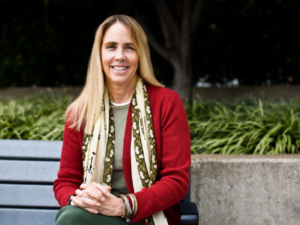 Beyond her presence in the classroom, Shepard demonstrated support for NLP in other ways. In 2012, she brought her talents to a cooperative project with the American Library Association and subsequently traveled to Beirut, Lebanon to explore creating a news literacy training program at several universities in collaboration with the ALA. She also wrote about NLP and media literacy.
Beyond her presence in the classroom, Shepard demonstrated support for NLP in other ways. In 2012, she brought her talents to a cooperative project with the American Library Association and subsequently traveled to Beirut, Lebanon to explore creating a news literacy training program at several universities in collaboration with the ALA. She also wrote about NLP and media literacy.
Marsden, Shepard’s longtime partner whom she married in 2021, said that her work with NLP was a logical extension of a career focused on journalism and ethics and education. “She always seemed to come back to news literacy,” he said. “She felt very proud of the way [NLP] was growing and expanding.”
In 2014, Shepard became a monthly donor to NLP, a process that continued until her passing — making hers one of the longest-running commitments in the history of the organization. She is recognized as a member of NLP’s Legacy Society as well, after having bequeathed a portion of her estate to the organization.
“Lisa engaged, inspired, and informed scores of educators and students as a passionate advocate for news literacy,” Miller said. “Her generous bequest will now support NLP’s work as the final piece of her meaningful legacy with us.

